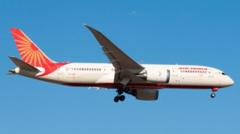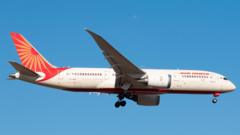A tragic incident occurred early on December 29, 2024, when a Jeju Air Boeing 737-800 crashed in southwestern South Korea, sparking intense investigations into the cause. This aircraft model, which makes up around 15 percent of the worldwide fleet of planes, is widely trusted and utilized by nearly 200 airlines, known for its safety record and longevity. The exact cause of the crash is still undetermined, though officials are exploring the possibility of a bird strike leading to a malfunction in the landing gear.
Boeing 737-800 Crashes in South Korea: Investigations Underway

Boeing 737-800 Crashes in South Korea: Investigations Underway
A Jeju Air Boeing 737-800 crashes, raising concerns about the safety of the popular aircraft model used by numerous airlines globally.
The Boeing 737-800 model has been a critical player in global aviation since its introduction, with approximately 4,400 planes in operation, accounting for a significant part of the aviation sector. Various airlines, including five based in South Korea, have been utilizing this aircraft, which is part of Boeing's Next-Generation 737 family. The plane that crashed, which had been in service for 15 years, was leasing from SMBC Aviation Capital, originally operated by Ryanair.
The crash has prompted experts to comment on the reliability of Boeing's designs, particularly concerning the landing gear. Najmedin Meshkati, an engineering professor with expertise in aviation safety, emphasized the importance of maintenance in ensuring operational safety, noting that the landing gear was historically reliable, but improper upkeep could lead to failures.
Following the crash, Boeing has reached out to Jeju Air to offer assistance in the ongoing investigation. Experts have cautioned against hasty conclusions, as aircraft crashes often result from a combination of factors, necessitating thorough inquiries that can take considerable time. While bird strikes are not rare, safety measures at airports, such as the techniques used at Muan International Airport, highlight efforts to mitigate such risks.
As investigations continue, the aviation community and the public await further information on the crash and its implications for the future of the Boeing 737-800 model.
The crash has prompted experts to comment on the reliability of Boeing's designs, particularly concerning the landing gear. Najmedin Meshkati, an engineering professor with expertise in aviation safety, emphasized the importance of maintenance in ensuring operational safety, noting that the landing gear was historically reliable, but improper upkeep could lead to failures.
Following the crash, Boeing has reached out to Jeju Air to offer assistance in the ongoing investigation. Experts have cautioned against hasty conclusions, as aircraft crashes often result from a combination of factors, necessitating thorough inquiries that can take considerable time. While bird strikes are not rare, safety measures at airports, such as the techniques used at Muan International Airport, highlight efforts to mitigate such risks.
As investigations continue, the aviation community and the public await further information on the crash and its implications for the future of the Boeing 737-800 model.




















